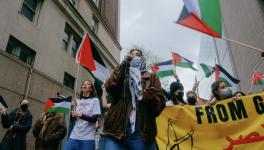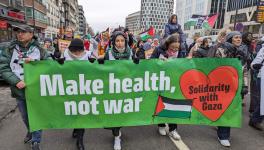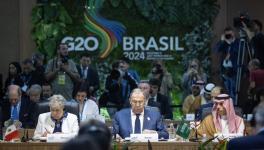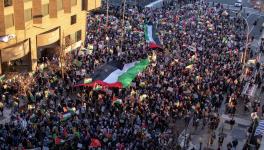Cost of Living Crisis Worsens in Egypt Soon After IMF Loan Deal
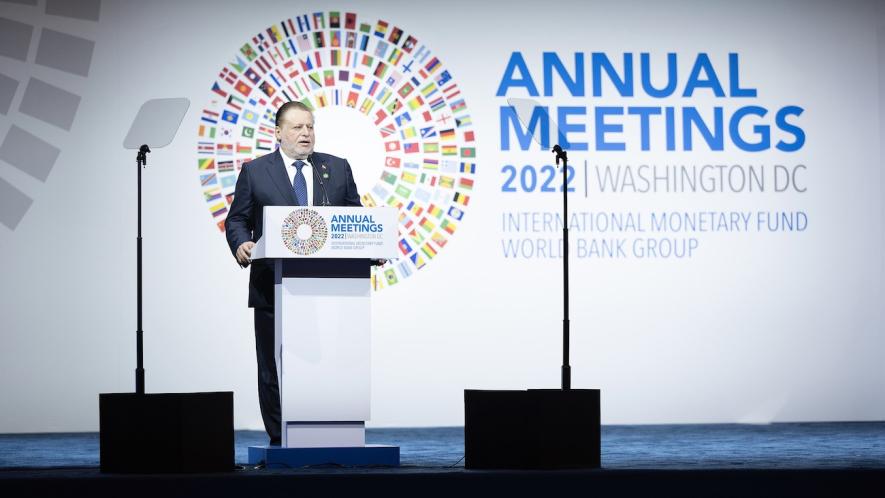
Hassan Abdalla, Governor of the Central Bank of Egypt, addressing the IMF's annual meeting in October 2022. Photo: World Bank
Egyptians are being hit with another round of price increases less than three weeks after their government implemented further economic “reforms” to satisfy the conditions attached to the additional bailout loan it secured from IMF earlier this month.
Effective from March 22, the government has imposed a hike of over 33% on the price of butane gas cylinders, on which millions—especially poorer households—depend for cooking, as the supply of natural gas is limited to just over half of all Egyptian households.
Another price hike of almost 18% on diesel, which fuels most of the transportation of people and goods, will exert further upward pressure on the prices of commodities, including essentials like food. As of February, Egyptians were already suffering a food price rise of more than 50% over the last year.
On March 6, Egypt secured a deal with the IMF, which agreed to cough up another USD 5 billion, increasing its bailout program ongoing since 2022 from a loan of three billion to eight billion dollars.
“The objective under the Fund-supported program is” to get the government to stop exercising controls over its currency’s exchange rate and “shift to a flexible exchange rate regime whereby the value of the Egyptian pound would be determined freely against other currencies.” the IMF explained.
The government’s fulfillment of this “objective” of the IMF immediately brought the Egyptian pound crashing down in value by 55%, plunging it to a record low of 48 pounds per US dollar. Being a net energy importer, this has meant a major loss in the country’s buying power.
Through this fuel price hike, the government has passed on this loss to its people, almost 30% of whom are in poverty, which has been on the rise under the rule of President Abdel Fattah el-Sisi.
While agreeing to let the market determine the value of its currency, the Egyptian central bank’s governor Hassan Abdalla added the proviso that “the central banks in any country have the right to intervene if there are illogical movements.”
Nevertheless, it seems an additional erosion of the purchasing power of a people already suffering a cost of living crisis amid a record high inflation is not an “illogical movement”, but very much a part of the logic of the “reforms” underway.
IMF set to destroy Egypt’s public sector
“The authorities are showing strong commitment to act promptly on all critical aspects” of the “economic reform program” imposed with this loan, the IMF said in a statement on March 6 after striking the deal, commending Sisi’s government.
This is likely to mean that the crisis will be further compounded with upward pressure on unemployment and downward pressure on wages as these other “critical aspects” include the expedited elimination of Egypt’s public sector.
Despite a privatization drive underway since 1990, Egypt’s public sector still provides almost a quarter of all employment in the country and offers better terms than the private sector which is predominantly informal.
The IMF, however, commended the “accelerated pace” at which this public sector is shrinking, especially since mid-2023 when Egypt’s government announced the sale of USD 1.9 billion of stakes in state-owned entities, including in petrochemicals, telecom and banking.
The IMF had enthusiastically welcomed this move on the day after the announcement of this sale in July 2023, explaining that “the gradual withdrawal of the state from economic activity”, i.e. the elimination of the public sector, is a “critical component” of its “program”.
As a condition for securing an additional bailout loan on March 6, the Egyptian government has agreed to use “a substantial part” of the proceeds from this sale of the public sector to pay old debts, the IMF added in its statement on March 6 as it sanctioned additional debt. Egypt has also agreed to “limit the total amount of public investment from all sources”.
In its own words, the IMF has prescribed “a new framework to slow down infrastructure spending” by the government as one of the “pillars” of this reform program attached to the bailout agreed on March 6.
Are refugees from Gaza a part of the quid pro quo?
Despite IMF’s denial, developments preceding this loan have led many observers to question if an unwritten condition of this bailout also requires Egypt to take in the Palestinians from Gaza, effectively helping Israel to ethnically cleanse the strip of land it has besieged since the late 2000s.
Soon after Israel started this war in October, the prospect of debt relief was reportedly dangled before the Egyptian government by Israel as well as by the US in exchange for allowing Israel to drive the Palestinians of Gaza across the border into Egypt’s Sinai desert.
Denying these reports, Egypt had categorically said in a statement from its presidency that it was “rejecting and deploring the policy of displacement or attempts to liquidate the Palestinian cause at the expense of neighboring countries” as a “red line that will not be compromised”.
Nevertheless, attempts to convince Egypt appeared to persist. Kristalina Georgieva, managing director of the IMF, over which the US effectively has a veto power, had said last November that the IMF was “seriously considering” this additional bailout agreed upon on March 6, to help Egypt cope with “economic difficulties posed by the Israel–Gaza war.”
IMF spokesperson Julie Kozack told a press conference late last month, “With respect to the question on the potential impact pressures from refugees from Gaza, what we do see in Egypt is that there is a need to have a very comprehensive support package”.
Only a week earlier, the Sinai Foundation for Human Rights had reported that Egypt was constructing “an isolated security zone” in the desert on “the border with the Gaza Strip, with the aim of receiving refugees from Gaza.” Several critics have described it as a “concentration camp”.
The agreement with the IMF increasing its loan to USD 8 billion was secured soon after. On the heels of this agreement, the European Union (EU) also agreed to fund Egypt another USD 8 billion on March 17, followed by the World Bank which committed USD 6 billion on March 18.
Get the latest reports & analysis with people's perspective on Protests, movements & deep analytical videos, discussions of the current affairs in your Telegram app. Subscribe to NewsClick's Telegram channel & get Real-Time updates on stories, as they get published on our website.









